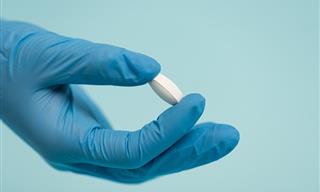Inositol is a naturally occurring sugar in your body that plays an important part in maintaining the structural integrity of cells. It can be found in a variety of foods, including fruits, meat, grains, beans, and legumes. Inositol is often referred to as vitamin B8, though it is not actually a vitamin.

Research suggests that inositol plays a role in vital processes. Apart from its role in cell membrane development, inositol may impact insulin and neurotransmitters in the brain, potentially affecting metabolic and mental health management. This article discusses the potential health benefits and uses of inositol.
Related: 5 of the MOST Underdiagnosed Mental Health
1. May reduce anxiety

Inositol affects the processes that lead to the synthesis of neurotransmitters, which are vital chemicals that allow the brain to communicate. Serotonin is one of these neurotransmitters that is impacted by inositol.
Serotonin has many different functions in the body and has a major effect on mood and behavior. This includes anxiety disorders such as post-traumatic stress disorder (PTSD), obsessive-compulsive disorder (OCD), and panic disorder. Research suggests that inositol may offer a potential avenue for reducing the frequency of panic attacks in individuals with panic disorders.
2. Can help with depression

The potential of inositol as a remedy for depression is rooted in its effects on brain neurotransmitters. Studies show that a daily consumption of 12 grams over a four-week period can effectively reduce depression symptoms relative to a placebo, highlighting its promising therapeutic impact. Also, the findings of a small-scale study indicated that the use of 6 grams of inositol per day showed a positive effect on depression, benefiting 9 out of 11 participants.
3. Can improve fertility prospects for women battling PCOS

When a woman's body overproduces certain hormones, it can lead to Polycystic Ovary Syndrome (PCOS). Those grappling with PCOS not only have an elevated risk of several diseases but may also encounter difficulties achieving fertility.
Reduced fertility in women with PCOS may stem from issues with insulin sensitivity. Studies have shown that inositol, at doses of two to four grams per day, may have a beneficial effect on ovarian function and fertility in women with PCOS. There have been positive results observed across normal-weight, overweight, and obese women, demonstrating its potential to enhance menstrual cycle regularity, ovulation, and pregnancy rates in this population.
4. Benefits for metabolic disorders

Research suggests that inositol has benefits for metabolic diseases that are associated with conditions like high blood pressure, diabetes, and metabolic syndrome. When myo-inositol and d-chiro-inositol were taken daily in addition to anti-diabetes medications, people with type 2 diabetes saw significant improvements in their fasting blood glucose levels (from 192.6 mg/dL to 160.9 mg/dL) and A1C levels (from 8.6% to 7.7%) after three months. This was based on a pilot study that was published in the International Journal of Endocrinology in 2016.
5. May help with blood sugar control

Insulin plays a vital role in regulating blood sugar levels in the body. Generally, insulin resistance happens when the body is unable to absorb insulin. It is often associated with conditions such as metabolic syndrome. In addition to improving insulin sensitivity and reducing insulin resistance, inositol helps cells produce molecules that are essential for insulin to function.
The results of a six-month study involving 80 postmenopausal women with metabolic syndrome revealed that the daily consumption of 4 grams of inositol led to notable improvements in insulin sensitivity, blood pressure, and cholesterol levels when compared to a placebo. Likewise, research focusing on women with gestational diabetes has also highlighted the favorable impact of inositol on insulin sensitivity and blood sugar control.
Related: Keep Your Blood Sugar Levels Down With This Guide
Possible side effects of inositol
Inositol is considered safe for adults, and any potential side effects are typically mild, consisting of symptoms such as nausea, stomach pain, fatigue, headaches, and dizziness. These side effects are more likely to occur with doses exceeding 12 grams per day.
Consult a physician before taking inositol or any other supplement. As inositol may cause reactions with other medications, substances, or supplements you take, let your doctor know about all of them. When treating a medical or mental health issue, inositol should never be used in place of established therapies.
Sources and dosages

Found in a diverse array of foods, inositol is most abundant in beans, fruits, nuts, and grains. Depending on the items you eat, the amount typically consumed each day might range from less than 1 gram to a few grams.
Inositol supplements are available in tablet and capsule forms. They do not come with a prescribed daily intake or a standardized dosing timetable.
The most popular inositol supplements are D-chiro-inositol, inositol hexaphosphate (commonly abbreviated as "IP6"), and the complex myo-inositol. They are generally deemed safe when consumed as directed.
 Go to BabaMail
Go to BabaMail






























